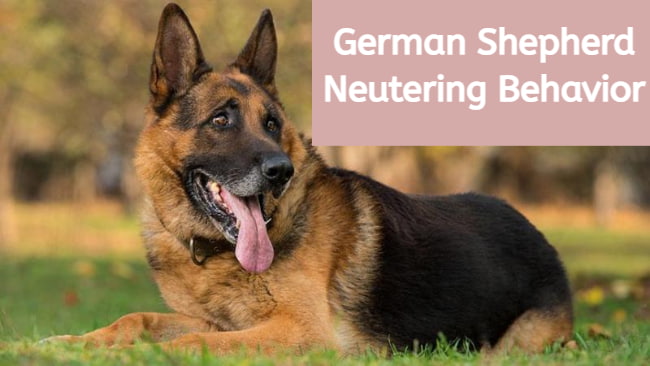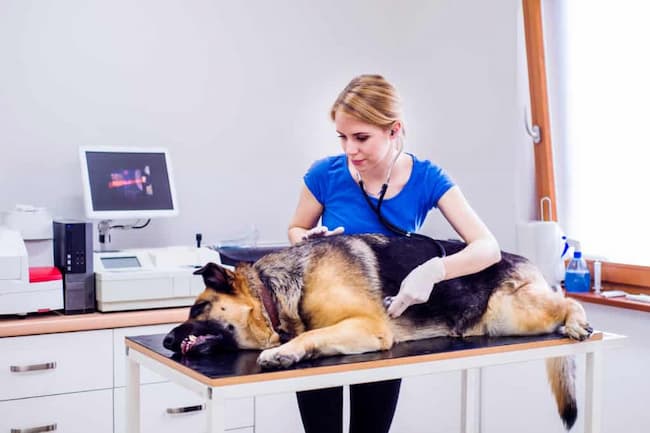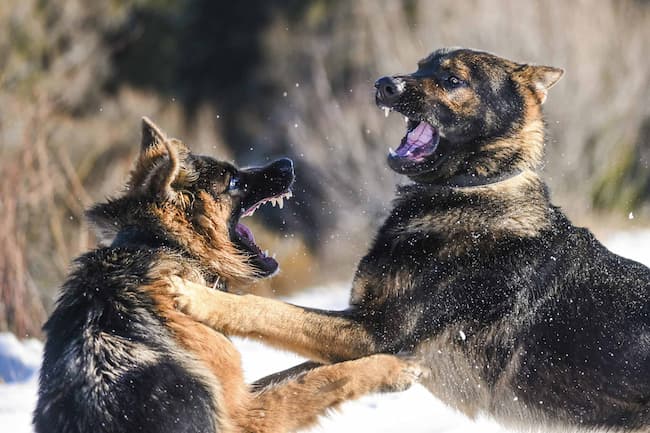Want to know about German Shepherd neutering behavior? Came to the right place. If you are the owner of a German shepherd, then you may be considering neutering your pet. Neutering is a surgical procedure that removes the male dog’s testicles. It is a common practice, and it can help reduce certain behavioral problems in dogs.

This is a big decision, and it’s important to know what to expect after the surgery is done. In this article, we will discuss the typical German Shepherd neutering behavior changes that take place after a GSD is neutered. We will also cover any potential health risks associated with the procedure. Also, get some tips on how to help your dog adjust to life after surgery.
What is Neutering in German Shepherds?
Neutering in any dogs or cats refers to the surgical procedure of removing the testicles. The testicles, or testes, are responsible for producing both testosterone and sperm in males. By removing them, you can prevent your dog from ever reproducing and experiencing some unwanted behavioral issues associated with increased male hormones.

Why Should You Neuter Your German Shepherd?
There are several reasons why you might consider neutering your German shepherd. The main reason is to reduce the risk of unwanted litters, which can lead to increased shelter populations and contribute to the number of pets that need homes.
Additionally, testosterone in male dogs can cause certain undesirable behaviors, such as aggression or marking territory with urine. By neutering your dog, you can help manage some of these behaviors. Some of the reasons why you should consider neutering your German Shepherd are:
- Reduced risk of an unwanted litter
- Reduced aggression and other problematic behaviors
- Improved health and overall quality of life for your dog
- Reduced fights with other male dogs
German Shepherd Neutering Behavior
One of the biggest concerns that many owners have about neutering is that it might cause behavioral changes in their dogs. While there are certain behavioral changes that may occur after a German shepherd is neutered, most are relatively minor and will subside over time. If you are a crossbreed dog lover, then know about this breed of Chow Chow mixed with German Shepherd.
Here are some of the common behavioral changes that you can expect to see after your dog has been neutered.
- Less aggression toward other dogs or people
- Reduced marking behaviors, such as urinating to mark territory
- Less territorial guarding behaviors
- Less anxious or aggressive behavior during stressful situations, such as loud noises or social interactions with unfamiliar dogs
How is German Shepherd Behavior After Neutering?
While the behavioral changes that occur after a German shepherd are neutered can be concerning, it’s important to remember that they are temporary. Most of these behaviors will resolve on their own over time and should not cause lasting problems for your dog.

If you are considering neutering your German shepherd, talk to your vet about any potential health risks, and make sure to provide your dog with plenty of support as he adjusts to life after surgery. Overall, neutering your German shepherd is a smart decision that can help improve both his physical and behavioral health.
Just be sure to work closely with your vet to manage any potential side effects or health risks associated with the procedure. With a little patience and plenty of love and support, your German shepherd can adjust to life after neutering and continue living a happy, healthy life.
Potential Risks of Neutering a German Shepherd
Along with the potential benefits of neutering your German shepherd, it’s important to be aware of any potential risks or side effects associated with the procedure. Some common concerns include:
- German Shepherd neutering behavior changes that may not resolve over time
- Increased risk of infections or other health complications
- Development of certain behavioral issues, such as anxiety or aggression
- Increased risk of urinary incontinence
If you are considering neutering your German shepherd, it’s important to talk to your vet about any potential risks or side effects. With proper care and monitoring, however, most dogs will make a full recovery after neuter surgery and continue living happy, healthy lives. Also, know why do German Shepherds follow you everywhere around the house.
How Old Should My German Shepherd Dog Be When I Neuter Him?
There is no definitive answer to this question, as it will depend on a number of factors, such as your dog’s individual health and development. Generally speaking, most vets recommend neutering your German shepherd at around 6 months of age.
This allows your dog to reach maturity before undergoing surgery and helps ensure a full recovery with minimal complications. However, it’s important to work closely with your vet to make sure that your dog is a good candidate for neuter surgery and will be able to recover quickly and easily.
Conclusion
While these risks of German Shepherd neutering behavior should not deter you from neutering your German shepherd, it’s important to be aware of them and work with your vet to manage any potential side effects. With the right care and support, however, most German shepherds will make a smooth transition after surgery. Hope this guide was helpful. Stay tuned to Germanshepherds for more similar guides.
